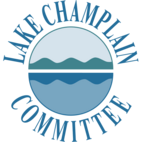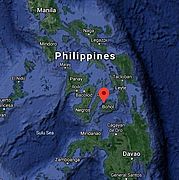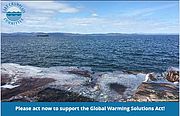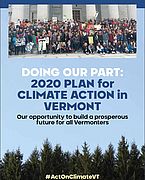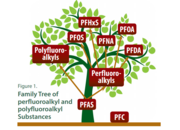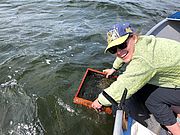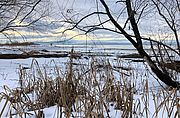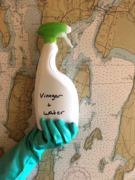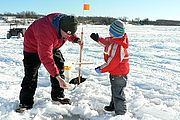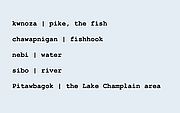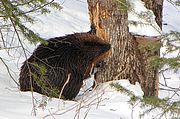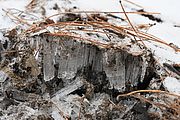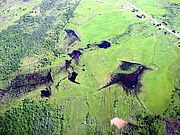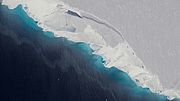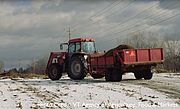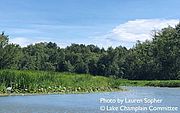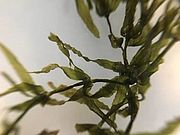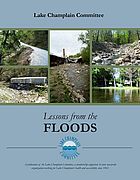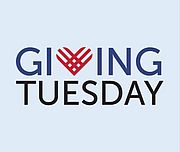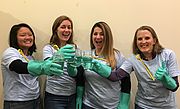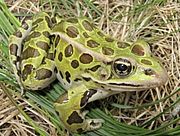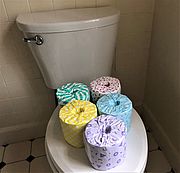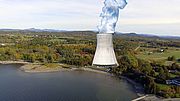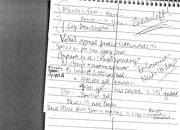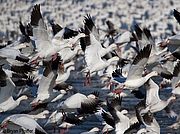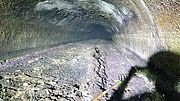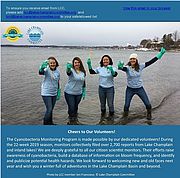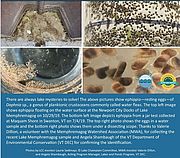As the seas rise higher, low lying islands and coastal areas are continually threatened by floods. Batasan, an island in the Philippines, is no exception. In 2013, a major earthquake (7.2 magnitude) hit the island, causing it to collapse downward.
Read...News from Selected Month
The Vermont Global Warming Solutions Act (GWSA - H.688) will be on the House floor tomorrow, February 20 for a crucial vote. The bill sets binding targets and holds the state accountable to develop and implement a plan to meet Vermont’s commitment to the Paris Climate Accord by 2025 and achieve net-zero carbon emissions by 2050.
Read...Recognizing that climate change poses an existential threat to Lake Champlain water quality, LCC was among 30 diverse organizations to present a policy plan of action to Vermont leaders in January. Since 2006, the state has had statutory goals to cut carbon pollution but we are very far from meeting them. Vermont is falling behind its Northeast neighbors in making pollution reductions, in part because the state lacks requirements to do so.
Read...Earlier this month Jared Carpenter, LCC’s Water Protection Advocate, joined with colleagues from the Vermont Conservation Voters, Vermont Natural Resource Council and other organizations to present the 2020 Environmental Common Agenda. The Common Agenda represents priorities of environmental groups across Vermont who are working to engage policy makers and citizens on important issues that affect water, air, land, wildlife, communities and health.
Read...In July 2019, LCC welcomed Lauren Sopher to the staff as our Director of Science and Water Programs. Lauren grew up in Vermont traipsing after frogs and toads along Monroe Brook, paddling the LaPlatte River, and exploring Lake Champlain’s surface and shorelines.
Read...A grant from outdoor gear co-op REI will enable LCC to purchase signage for Lake Champlain Paddlers’ Trail sites, update website content, and produce informational materials about the Trail. The funds will also cover a touring kayak and related gear for LCC field programs. “This REI grant will help us publicize the Trail, re-sign locations and upgrade our equipment,” notes LCC Executive Director Lori Fisher. “We’re grateful for the support to advance our stewardship.” REI will also be partnering with LCC on April Stools’ Day and aquatic invasive species assessments.
Read...Lakeshore and grassland are like yin and yang: seemingly opposite forces that are complimentary. The lakeshore provides water disturbance to the grass and the grassland provides shoreline stabilization to the lake—both processes shape this natural system.
Read...Every space gets dirty. Whether at home, at work, or somewhere in between, most of us use cleaning products on a regular basis to tidy up. While commercial products may get things squeaky clean, they can also do more harm than good. Many contain ingredients that can be acutely toxic; carcinogenic or mutagenic; irritating to skin, eyes or lungs; non-biodegradable; poisonous to aquatic organisms; or water and air polluting. Some common components of store bought cleaners to watch out for include ammonium, formaldehyde, glycol ethers, sodium borate, sodium laureth sulfates along with artificial colors, dyes and fragrances.
Read...Plant identification is not restricted to a particular season. Though woody plants can be difficult to identify in winter, the activity adds a new dynamic to winter adventures and is a fun challenge. Read on for identification tips about two common wetland shrub species, speckled alder (Alnus incana) and red-osier dogwood (Swida sericea), along with their value and role in wetland ecology.
Read...There is great potential behind a hole in the ice. On Lake Champlain, those holes are often related to ice fishing. You can make ice fishing what you want it to be: a social or solo activity, over a short or long timespan, and on open ice or under the cover of a shanty. No matter the approach, it’s an activity that gets folks outside and interacting with the natural world in the wintertime.
Read...In partnership with Jesse Bowman Bruchac, a Nulhegan Abenaki citizen and a teacher of the Abenaki language, the Middlebury Language Schools is launching a pilot School of Abenaki in summer 2020. Native to New England and Quebec, the Abenaki language is considered endangered.
Read...Beavers are active year-round. Explore what a beaver lodge and dam is like in the wintertime with conservation biologist, Steve Faccio, and Outdoor Radio co-hosts, Kent McFarland and Sarah Zahendra, at a frozen beaver pond in Pomfret, VT. From huddling together in lodges to storing their winter stash of food in the snow, you’ll learn about how North America’s largest rodent faces winter.
Read...Ice formations are a wonderful display of winter. Temperature gradients impact the formation and type of ice we observe. Water at or near the soil surface freezes and expands into the open space above ground, creating spectacular columns of ice, reminiscent of crystal chandeliers.
Read...The Trump Administration recently finalized a rule that removes protections on waterbodies across the country. Trump’s new rule, “Navigable Waters Protection Rule,” rolls back crucial components of the Obama administration’s 2015 rule, “Waters of the United States” and the 1972 Clean Water Act.
Read...Scientists studying Antartica’s Thwaites Glacier, larger in size than the state of Pennsylvania, are concerned about rising water temperatures at its “grounding line.” The grounding line is where the glacier transitions from laying on bedrock to floating on the ocean as ice shelves.
Read...A coalition of Environmental organizations—the Lake Champlain Committee (LCC), Conservation Law Foundation (CLF), Vermont Natural Resources Council (VNRC), and Vermont Audubon—issued a water quality-related press release on December 13, 2019.
Read...Protecting wetlands is a longstanding priority for the Lake Champlain Committee (LCC). The areas of interface between shoreland and water are a vital part of Lake Champlain’s ecosystem. Thank you for using your voice to protect Vermont’s wetlands now and into the future by contacting our legislators! We need a modern goal of a net gain in acres of wetlands through protection and restoration.
Read...In early September, Lake Champlain Basin Program Boat (LCBP) Launch Steward Matthew Gorton was conducting a routine boat inspection for invasive species prevention at a public access site in South Hero, Vermont when he noticed an unusual plant hanging off a boat trailer backing into the lake.
Read...Eight years ago last April 13, Lake Champlain reached flood stage (100 feet) and stayed above that level for a record-setting 67 days. Waters rose to 103.27 feet – the highest the lake has been since records have been kept. Lakeside homes, roads and buildings were inundated and battered by wind-driven waves. Then, on August 28, 2011 Tropical Storm Irene slammed into the Champlain Valley. Up to 11 inches of rain fell in the mountains; rivers swelled and flooded; homes, roads and bridges were wiped away.
Read...December 3 is Giving Tuesday, the "Black Friday" for charitable giving and part of an international movement to create a day of giving back. Please consider participating by making a gift of time or money to the Lake Champlain Committee.
Read...Hundreds of LCC-trained volunteers took to the water from mid-June through mid-November to assess conditions at more than 100 Lake Champlain and inland waterway sites. Each week they scoured the shoreline for signs of cyanobacteria, donned gloves and took water samples and faithfully filed online reports.
Read...When it comes to the wicked cold of winter, wildlife and humans are in it together: we bundle up, bunker down, hibernate, or head south. A plunge below Lake Champlain’s surface reveals the winter adaptations of hardy wildlife—it’s like watching a nature documentary in slow motion.
Read...Wastewater treatment and septic systems are designed to handle the four Ps—pee, poop, puke, and (toilet) paper—and nothing else. Flushing other paper products, plastics, disposable diapers, pharmaceuticals, dryer lint, condoms, tampons or applicators, or flotsam and jetsam is a big no-no. Wipes clog pipes, even if they are marketed as “flushable".
Read...Waterfowl add a bright note to frigid winter days. Many birds escape from colder northern climes to the comparative warmth of Lake Champlain. Ducks can be observed on the lake throughout the winter, in open waters or wherever the edge of the ice is.
Read...Fifty years ago this past September, LCC led grassroots opposition to a proposal to build a nuclear power plant on the Charlotte, VT shore. Kevin Burget of the Charlotte Conservation Commission interviewed LCC Advisory Council member Peter Paine for this retrospective on what happened to chart a different future for Lake Champlain.
Read...Eight months ago, an Addison County, Vermont farm spread excess liquid manure overtop its snow-covered fields. Since then, two Vermont state agencies, the Agency of Agriculture, Food & Markets (VAAFM) and the Agency of Natural Resources (VT ANR), Department of Environmental Conservation (VT DEC), have failed to penalize the farm for this violation.
Read...This report by biologist, writer, explorer Bryan Pfeiffer provides annual breaking news on the migration of snow geese through Vermont and New York. Clinton County, New York is currently 2019’s snow goose hotspot: 8,000 snow geese were observed in King Bay, south of Rouse’s Point, on November 25. Numbers have declined in Vermont, where 106 snow geese were noted at the Dead Creek Wildlife Management Area in Addison on November 26.
Read...Fatbergs have become commonplace in city sewer systems around the world. They are an accumulation of fat, oil, and grease congealed around common household solid waste items like “flushable” wipes, paper towels, and tampons. The removal of fatbergs places a financial burden on cities.
Read...This is the last report of the 2019 Lake Champlain and Inland Lake cyanobacteria monitoring season. Lake Champlain Committee (LCC) monitors and partners have filed over 2,700 reports from Lake Champlain and inland lakes during a 22-week season. We’re deeply grateful for their efforts. Read...
It’s snowing in the Lake Champlain Valley, coating much of our region in a gentle blanket of white as we enter our last weeks of cyanobacteria monitoring. The cooler temperatures make conditions much less hospitable for cyanobacteria, so not suprisingly, the majority of reports this week were for generally safe conditions. However, the bottom-dwelling cyanobacteria, Nostoc sp., was observed again at Lake Winona earlier in the week. Read...
